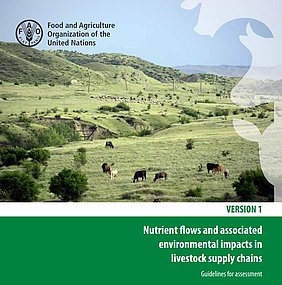Oct 1, 2018: ATB scientist PD Dr. Barbara Amon is one of the 36 experts of the Technical Advisory Group (TAG) on nutrient cycles and impact assessment who conducted the background research and developed the core technical content.
The guidelines are a product of the LEAP (Livestock Environmental Assessment and Performance) partnership, a multi-stakeholder initiative whose goal is to improve the environmental sustainability of livestock sector through better metrics and data. ATB scientist PD Dr. Barbara Amon is one of the 36 experts of the Technical Advisory Group (TAG) on nutrient cycles and impact assessment who conducted the background research and developed the core technical content.
Nutrient use in livestock production systems increased over the last decades due to the increased demand for livestock production. Consequently, in livestock supply chains, nutrient losses into the environment have contributed to environmental burdens and climate change. Therefore, there is strong interest in measuring nutrient flows to improve the environmental performance of the livestock sector.
The aim of the methodology developed in these guidelines is to introduce a harmonized international approach assessing nutrient flows and impact assessment for eutrophication and acidification for livestock supply chains taking the specificity of the various production systems involved into consideration. The methodology strives to increase understanding of nutrient use efficiency and associated environmental impacts and to facilitate improvement of livestock systems’ environmental performance.
FAO. 2018. Nutrient flows and associated environmental impacts in livestock supply chains: Guidelines for assessment (Version 1). Livestock Environmental Assessment and Performance (LEAP) Partnership. Rome, FAO. 196 pp.
The document is subject to continuous updates. Latest versions will be online: http://www.fao.org/partnerships/leap/publications/en/

